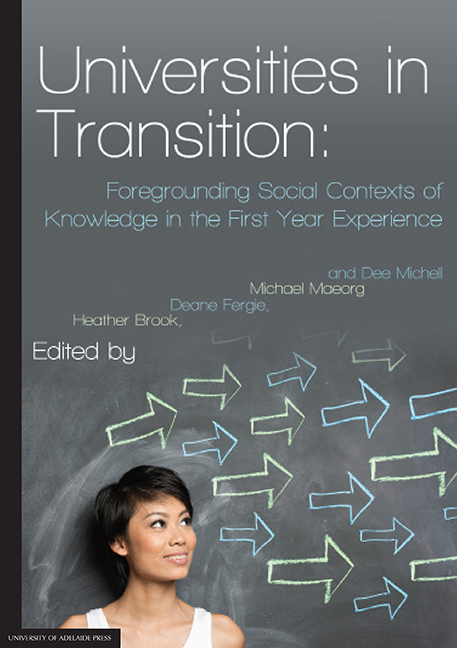Book contents
- Frontmatter
- Contents
- Notes on Contributors
- Introduction
- Part 1 Reconceptualising: transition and universities
- Part 2 Revaluing: ‘non-traditional’ student groups in higher education
- Part 3 Realising: transformations on campus
- 7 The University of Adelaide Student Learning Hub: a case study of education co-creation
- 8 Thinking critically about critical thinking in the First-Year Experience
9 - Knowing students
from Part 3 - Realising: transformations on campus
Published online by Cambridge University Press: 05 December 2014
- Frontmatter
- Contents
- Notes on Contributors
- Introduction
- Part 1 Reconceptualising: transition and universities
- Part 2 Revaluing: ‘non-traditional’ student groups in higher education
- Part 3 Realising: transformations on campus
- 7 The University of Adelaide Student Learning Hub: a case study of education co-creation
- 8 Thinking critically about critical thinking in the First-Year Experience
Summary
Abstract
In 2010 we taught a large first-year class of Women's Studies students. The previous year we had reviewed the literature amassing in support of the Federal Government's push to increase the representation of Indigenous, low socio-economic status (SES) and rural students at university in the wake of what is known as the Bradley Review (2008). This reading had sensitised us to the situation that some students were at risk of dropping out, particularly those who were first in their family at university, a category of students which overlaps with those who are Indigenous, rural or from low SES backgrounds, as well as some who are refugees. Not wanting to put students on the spot, but wanting to identify those who might need some extra support, we designed a ‘getting to know you’ questionnaire for students to complete in the first tutorial. While we both had a keen intellectual interest in the information we gathered, and while we both would have characterised ourselves as committed and conscientious teachers, we were unprepared for the transformative effect the exercise had on us.
Introduction
Marcia Devlin and Jade McKay (Chapter 4, this book) assert that ‘to enable, facilitate and support student agency, university teachers and other staff should know their students’ (106). According to Rose Zimbardo (1993), a US academic, knowing something about our students is crucial to effective teaching because a student's personal history is bound to affect their experience of the classroom.
- Type
- Chapter
- Information
- Universities in TransitionForegrounding Social Contexts of Knowledge in the First Year Experience, pp. 229 - 244Publisher: The University of Adelaide PressPrint publication year: 2014



